Problem Statement
- When the program is executed, a single command-line argument should be provided. That argument will be the path to a file containing descriptions for each tool in the toolbox. If the argument is not provided, or the input file cannot be successfully read or parsed, the program should print "Invalid Input" and terminate.
- The input file will contain at least two lines of input. The first line will give the number of tools included in the input file as an integer. Each subsequent line will identify a particular tool using the name of the class representing the tool, followed by values for each attribute of the tool. The values will be separated by spaces, and listed in the same order as those attributes are accepted in the tool's constructor.
- Once the input is read, the program will then accept a query as input via the terminal. That input should consist of multiple parts on a single line, separated by a space. The first part will be the name of an action that needs to be performed, and then following that will be one or more values to be provided to that action as arguments, separated by spaces.
- The program will review its list of available tools, finding any tool that supports that action. It will then call the method in that tool that corresponds with the action (the method and action names will be the same), providing the values as an arguments. If the tool responds with true to that method call, then that tool is able to perform that action. The program should print the description of the appropriate tool to the terminal and terminate. In this example, each query will only result in one matching tool, if any.
- If a matching tool cannot be found, or there is any errors reading the input from the terminal, the program should print "Invalid Tool" and terminate.
Head → Desk

Image Credit: Giphy
Let's break it down into classes
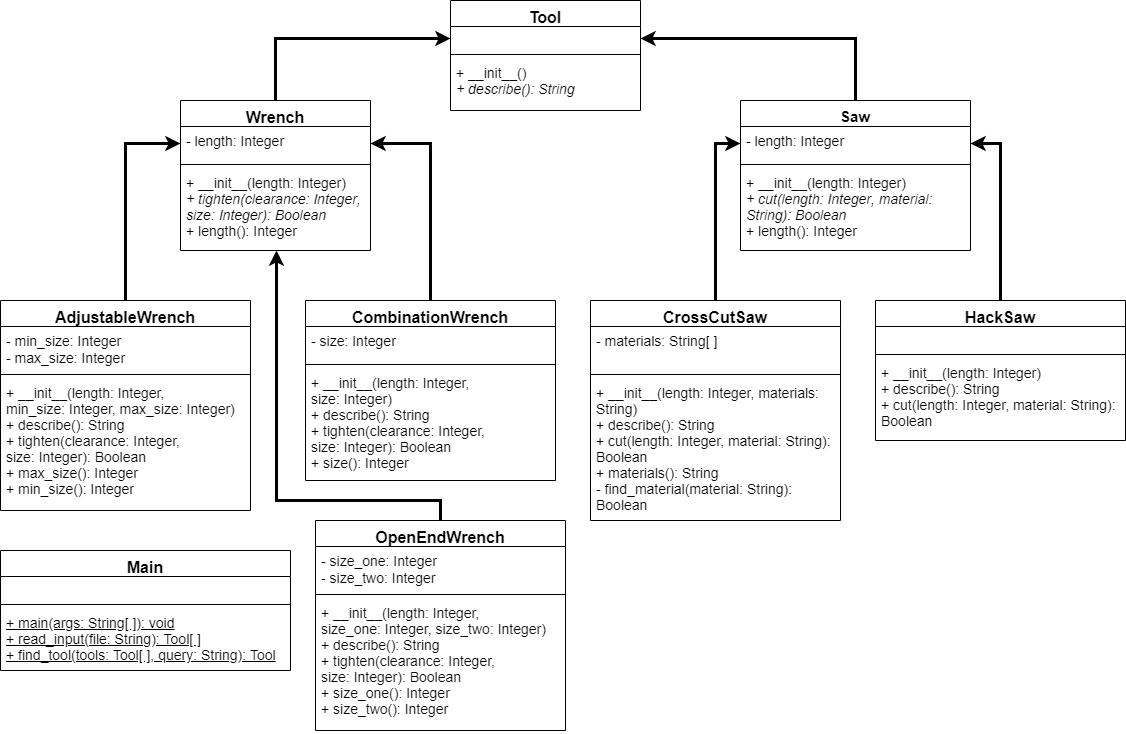
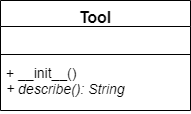
from abc import ABC, abstractmethod
class Tool(ABC):
def __init__(self):
pass
@abstractmethod
def describe(self):
pass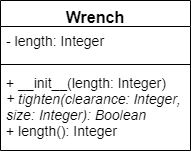
from Tool import *
from abc import ABC, abstractmethod
class Wrench(Tool, ABC):
def __init__(self, length):
self.__length = length
@property
def length(self):
return self.__length
@abstractmethod
def tighten(self, clearance, size):
pass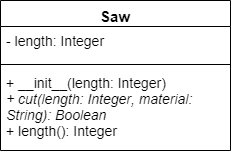
from Tool import *
from abc import ABC, abstractmethod
class Saw(Tool, ABC):
def __init__(self, length):
self.__length = length
@property
def length(self):
return self.__length
@abstractmethod
def cut(self, length, material):
pass 
Check Structure!
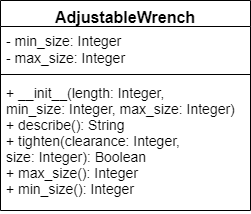
from Wrench import *
class AdjustableWrench(Wrench):
def __init__(self, length, min_size, max_size):
super().__init__(length)
self.__min_size = min_size
self.__max_size = max_size
@property
def min_size(self):
return self.__min_size
@property
def max_size(self):
return self.__max_size
# other methods go here
from Wrench import *
class AdjustableWrench(Wrench):
def __init__(self, length, min_size, max_size):
super().__init__(length)
self.__min_size = min_size
self.__max_size = max_size
@property
def min_size(self):
return self.__min_size
@property
def max_size(self):
return self.__max_size
def describe(self):
return "AdjustableWrench: Length: {} MinSize: {}
MaxSize: {}".format(self.__length,
self.__min_size, self.__max_size)
# other methods go here
from Wrench import *
class AdjustableWrench(Wrench):
def __init__(self, length, min_size, max_size):
super().__init__(length)
self.__min_size = min_size
self.__max_size = max_size
@property
def min_size(self):
return self.__min_size
@property
def max_size(self):
return self.__max_size
def describe(self):
return "AdjustableWrench: Length: {} MinSize: {}
MaxSize: {}".format(self.__length,
self.__min_size, self.__max_size)
# other methods go here
from Wrench import *
class AdjustableWrench(Wrench):
def __init__(self, length, min_size, max_size):
super().__init__(length)
self.__min_size = min_size
self.__max_size = max_size
@property
def min_size(self):
return self.__min_size
@property
def max_size(self):
return self.__max_size
def describe(self):
return "AdjustableWrench: Length: {} MinSize: {}
MaxSize: {}".format(self.__length,
self.__min_size, self.__max_size)
# other methods go here
from Wrench import *
class AdjustableWrench(Wrench):
def __init__(self, length, min_size, max_size):
super().__init__(length)
self.__min_size = min_size
self.__max_size = max_size
@property
def min_size(self):
return self.__min_size
@property
def max_size(self):
return self.__max_size
def describe(self):
return "AdjustableWrench: Length: {} MinSize: {}
MaxSize: {}".format(self.length,
self.__min_size, self.__max_size)
# other methods go hereAdjustable Wrench
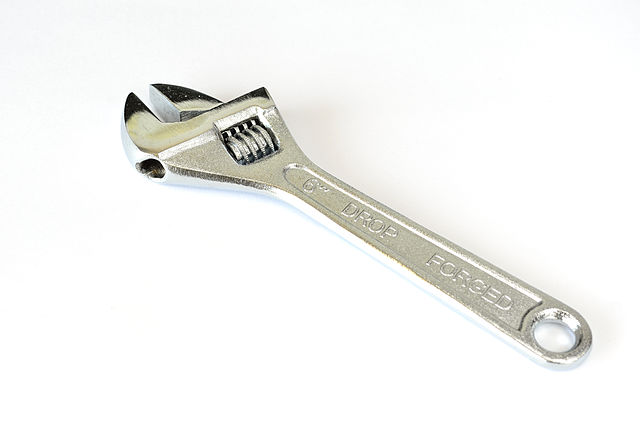

from Wrench import *
class AdjustableWrench(Wrench):
def __init__(self, length, min_size, max_size):
super().__init__(length)
self.__min_size = min_size
self.__max_size = max_size
@property
def min_size(self):
return self.__min_size
@property
def max_size(self):
return self.__max_size
def describe(self):
return "AdjustableWrench: Length: {} MinSize: {}
MaxSize: {}".format(self.length,
self.min_size, self.max_size)
def tighten(self, clearance, size):
return clearance >= self.length and
size >= self.min_size and
size <= self.max_sizeCombination Wrench

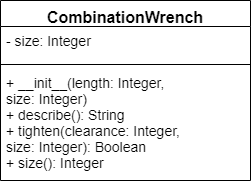
from Wrench import *
class CombinationWrench(Wrench):
def __init__(self, length, size):
super().__init__(length)
self.__size = size
@property
def size(self):
return self.__size
def describe(self):
return "CombinationWrench Length: {} Size: {}"
.format(self.length, self.size)
def tighten(self, clearance, size):
return clearance >= self.length and
size == self.sizeOpen End Wrench

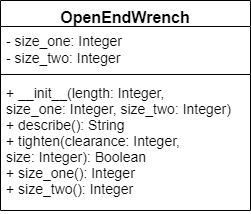
from Wrench import *
class OpenEndWrench(Wrench):
def __init__(self, length, size_one, size_two):
super().__init__(length)
self.__size_one = size_one
self.__size_two = size_two
@property
def size_one(self):
return self.__size_one
@property
def size_two(self):
return self.__size_two
def describe(self):
return "CombinationWrench Length: {} SizeOne: {}
SizeTwo: {}".format(self.length,
self.size_one, self.size_two)
def tighten(self, clearance, size):
return clearance >= self.length and
(size == self.size_one or
size == self.size_two)
Check Structure!
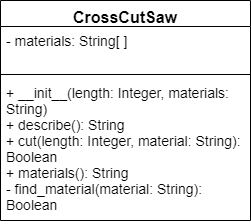
from Saw import *
class CrossCutSaw(Saw):
def __init__(self, length, materials):
super().__init__(length)
self.__materials = materials.split(":")
@property
def materials(self):
return ", ".join(self.__materials)
def describe(self):
"CrossCutSaw Length: {} Materials: {}".format(
self.length, self.materials)
# additional methods here
from Saw import *
class CrossCutSaw(Saw):
def __init__(self, length, materials):
super().__init__(length)
self.__materials = materials.split(":")
@property
def materials(self):
return ", ".join(self.__materials)
def describe(self):
"CrossCutSaw Length: {} Materials: {}".format(
self.length, self.materials)
# additional methods here
from Saw import *
class CrossCutSaw(Saw):
def __init__(self, length, materials):
super().__init__(length)
self.__materials = materials.split(":")
@property
def materials(self):
return ", ".join(self.__materials)
def describe(self):
"CrossCutSaw Length: {} Materials: {}".format(
self.length, self.materials)
def __find_material(self, material):
for m in self.__materials:
if m == material:
return True
return False
# additional methods here
from Saw import *
class CrossCutSaw(Saw):
def __init__(self, length, materials):
super().__init__(length)
self.__materials = materials.split(":")
@property
def materials(self):
return ", ".join(self.__materials)
def describe(self):
"CrossCutSaw Length: {} Materials: {}".format(
self.length, self.materials)
def __find_material(self, material):
for m in self.__materials:
if m == material:
return True
return False
def cut(self, length, material):
return length < self.length
and self.__find_material(material)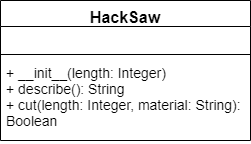
from Saw import *
class HackSaw(Saw):
def __init__(self, length):
super().__init__(length)
def describe(self):
return "HackSaw Length: {} Material: metal".
format(self.length)
def cut(self, length, material):
return length < self.length and
material == "metal"
Check Structure!
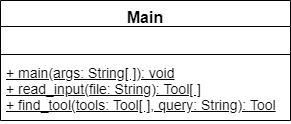
from Wrench import *
from AdjustableWrench import *
from CombinationWrench import *
from OpenEndWrench import *
from Saw import *
from HackSaw import *
from CrossCutSaw import *
import sys
class Main:
# methods go here
# main guard
if __name__ == "__main__":
Main.main(sys.argv)
from Wrench import *
from AdjustableWrench import *
from CombinationWrench import *
from OpenEndWrench import *
from Saw import *
from HackSaw import *
from CrossCutSaw import *
import sys
class Main:
# methods go here
# main guard
if __name__ == "__main__":
Main.main(sys.argv)@staticmethod
def read_input(filename):
try:
with open(filename) as reader:
num_tools = int(reader.readline())
tools = []
return tools
except Exception:
print("Invalid Input")
return []@staticmethod
def read_input(filename):
try:
with open(filename) as reader:
num_tools = int(reader.readline())
tools = []
for i in range(0, num_tools):
return tools
except Exception:
print("Invalid Input")
return []@staticmethod
def read_input(filename):
try:
with open(filename) as reader:
num_tools = int(reader.readline())
tools = []
for i in range(0, num_tools):
line = reader.readline().split(" ")
return tools
except Exception:
print("Invalid Input")
return []@staticmethod
def read_input(filename):
try:
with open(filename) as reader:
num_tools = int(reader.readline())
tools = []
for i in range(0, num_tools):
line = reader.readline().split(" ")
if line[0] == "AdjustableWrench":
elif line[0] == "OpenEndWrench":
elif line[0] == "CombinationWrench":
elif line[0] == "CrossCutSaw":
elif line[0] == "HackSaw":
else:
raise Exception("Unknown Tool: " + line[0])
return tools
except Exception:
print("Invalid Input")
return []@staticmethod
def read_input(filename):
try:
with open(filename) as reader:
num_tools = int(reader.readline())
tools = []
for i in range(0, num_tools):
line = reader.readline().split(" ")
length = int(line[1])
if line[0] == "AdjustableWrench":
min_size = int(line[2])
max_size = int(line[3])
tools.append(AdjustableWrench(length, min_size, max_size))
elif line[0] == "OpenEndWrench":
size_one = int(line[2])
size_two = int(line[3])
tools.append(OpenEndWrench(length, size_one, size_two))
elif line[0] == "CombinationWrench":
size = int(line[2])
tools.append(CombinationWrench(length, size))
elif line[0] == "CrossCutSaw":
tools.append(CrossCutSaw(length, line[2]))
elif line[0] == "HackSaw":
tools.append(HackSaw(length))
else:
raise Exception("Unknown Tool: " + line[0])
return tools
except Exception:
print("Invalid Input")
return []@staticmethod
def find_tool(tools, query):
query_parts = query.split(" ")
@staticmethod
def find_tool(tools, query):
query_parts = query.split(" ")
if query_parts[0] == "tighten":
elif query_parts[0] == "cut":
else:
@staticmethod
def find_tool(tools, query):
query_parts = query.split(" ")
if query_parts[0] == "tighten":
clearance = int(query_parts[1])
size = int(query_parts[2])
elif query_parts[0] == "cut":
length = int(query_parts[1])
else:
@staticmethod
def find_tool(tools, query):
query_parts = query.split(" ")
if query_parts[0] == "tighten":
clearance = int(query_parts[1])
size = int(query_parts[2])
for t in tools:
if isinstance(t, Wrench):
elif query_parts[0] == "cut":
length = int(query_parts[1])
for t in tools:
if isinstance(t, Saw):
else:
@staticmethod
def find_tool(tools, query):
query_parts = query.split(" ")
if query_parts[0] == "tighten":
clearance = int(query_parts[1])
size = int(query_parts[2])
for t in tools:
if isinstance(t, Wrench):
if t.tighten(clearance, size):
return t
elif query_parts[0] == "cut":
length = int(query_parts[1])
for t in tools:
if isinstance(t, Saw):
if t.cut(length, query_parts[2]):
return t
else:
@staticmethod
def find_tool(tools, query):
query_parts = query.split(" ")
if query_parts[0] == "tighten":
clearance = int(query_parts[1])
size = int(query_parts[2])
for t in tools:
if isinstance(t, Wrench):
if t.tighten(clearance, size):
return t
return ??
elif query_parts[0] == "cut":
length = int(query_parts[1])
for t in tools:
if isinstance(t, Saw):
if t.cut(length, query_parts[2]):
return t
return ??
else:
return ??@staticmethod
def find_tool(tools, query):
query_parts = query.split(" ")
if query_parts[0] == "tighten":
clearance = int(query_parts[1])
size = int(query_parts[2])
for t in tools:
if isinstance(t, Wrench):
if t.tighten(clearance, size):
return t
return None
elif query_parts[0] == "cut":
length = int(query_parts[1])
for t in tools:
if isinstance(t, Saw):
if t.cut(length, query_parts[2]):
return t
return None
else:
return None@staticmethod
def find_tool(tools, query):
query_parts = query.split(" ")
if query_parts[0] == "tighten":
clearance = int(query_parts[1])
size = int(query_parts[2])
for t in tools:
if isinstance(t, Wrench):
if t.tighten(clearance, size):
return t
return None
elif query_parts[0] == "cut":
length = int(query_parts[1])
for t in tools:
if isinstance(t, Saw):
if t.cut(length, query_parts[2]):
return t
return None
else:
return None@staticmethod
def main(args):
if len(args) != 2:
print("Invalid Input")
return
@staticmethod
def main(args):
if len(args) != 2:
print("Invalid Input")
return
tools = Main.read_input(args[1])
@staticmethod
def main(args):
if len(args) != 2:
print("Invalid Input")
return
tools = Main.read_input(args[1])
if len(tools) == 0:
return
@staticmethod
def main(args):
if len(args) != 2:
print("Invalid Input")
return
tools = Main.read_input(args[1])
if len(tools) == 0:
return
try:
with sys.stdin as reader:
except Exception:
print("Invalid Tool")
return@staticmethod
def main(args):
if len(args) != 2:
print("Invalid Input")
return
tools = Main.read_input(args[1])
if len(tools) == 0:
return
try:
with sys.stdin as reader:
query = reader.readline()
t = Main.find_tool(tools, query)
except Exception:
print("Invalid Tool")
return@staticmethod
def main(args):
if len(args) != 2:
print("Invalid Input")
return
tools = Main.read_input(args[1])
if len(tools) == 0:
return
try:
with sys.stdin as reader:
query = reader.readline()
t = Main.find_tool(tools, query)
if t is not None:
print(t.describe())
else:
print("Invalid Tool")
except Exception:
print("Invalid Tool")
return